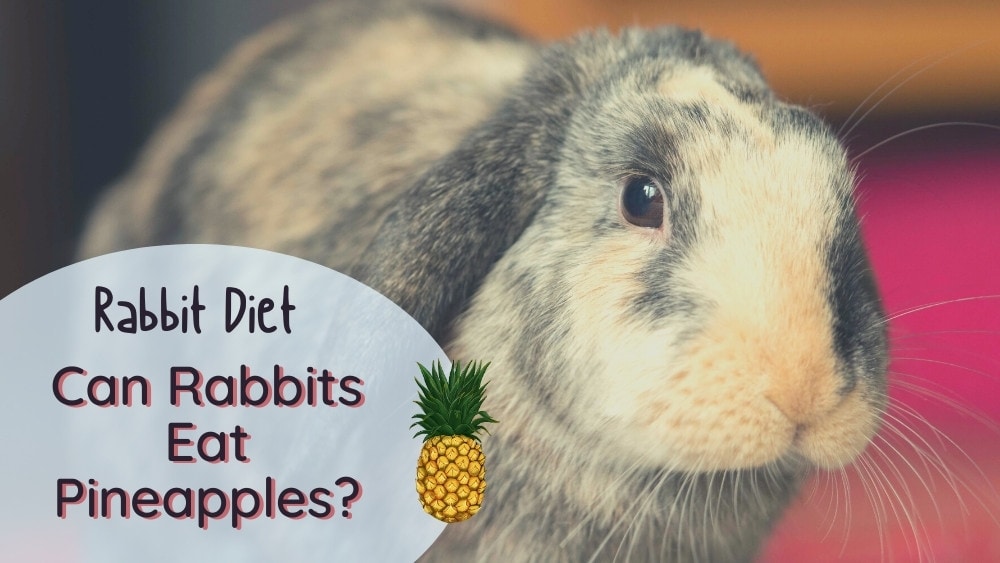Rabbits have very sensitive stomachs, and when you have a pet bunny, it is important to know what it can and can’t eat. You may have heard mixed information about whether rabbits can eat pineapple — is it good for their bellies, a great source of vitamin C, or dangerously acidic? Can rabbits digest pineapple or will it give them an upset stomach?
In this article, we’ll give you the low-down on the question: Can bunnies eat pineapple? We’ll cover all aspects of the topic, including:
- Can bunnies have pineapples?
- Nutritional value of pineapple for your rabbit
- How to feed your rabbit pineapple
Here is a comprehensive article that delves deeper into what parts of a pineapple you can feed your pet rabbit and if you can feed frozen, dried or pineapple juice to your bunnies.
Can Rabbits Eat Pineapples?
Yes, rabbits can eat pineapple, provided you only give small amounts 1-2 times a week. Pineapples contain a lot of natural sugar, which can cause bloating if fed in excess. Rabbits should not eat the spiky skin and pineapple leaves, as they are hard to chew and can be a choking hazard.
Nutritional Value of Pineapples for Rabbits
Before giving your pet any treats, it is good to consider all the health benefits and side effects. A small piece of pineapple is a good snack to give your pet bunny because it is a highly nutritious fruit containing a range of vitamins and minerals.
Here are some nutritional facts about pineapples, and why they’re a healthy treat for your pet rabbit:
- Pineapples are rich in fiber: The dietary fiber in pineapples helps keep the rabbit’s gastrointestinal tract healthy and helps prevent constipation and diarrhea.
- Pineapples contain minerals: Pineapples are full of magnesium, calcium, potassium, folate, iron, phosphorus, riboflavin, niacin, manganese, and zinc. This makes pineapple a great treat for bunnies, as they aid in keeping their muscles healthy.
- Pineapples contain vitamin B6: Vitamin B6 enhances a rabbit’s immune system and is essential for maintaining a rabbit’s healthy nervous system.
- A source of bromelain: Pineapples are also the only fruits containing the enzyme bromelain which helps the body to break down and digest proteins.
- Contains water: Pineapples are juicy and can help rabbits stay hydrated.
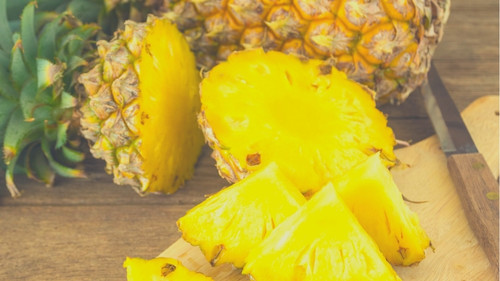
How to Feed Rabbits Pineapple
To make sure your pineapple helps your rabbit’s health, instead of causing it problems, follow these three steps.
Determine how much pineapple and how often to feed it
It is important to check how often you give treats to your rabbit, and this also applies when feeding pineapple. You should feed a balanced rabbit diet suitable for its size and weight, which should mainly comprise hay, pellets, and green leafy vegetables.
Adult rabbits can have a small piece of pineapple as their fruit portion 1-2 times a week. Each portion shouldn’t exceed around 1-2 teaspoons, or 1-2 small cubes of pineapple.
Prepare your rabbit’s pineapple
Make sure the pineapple you choose for your rabbit is ripe. You can prepare it as you normally would, removing the crown, skin and any “sharp eyes” left after you’ve taken off the pineapple skin.
Cut the pineapple into small chunks that will be easy for your bunny to eat. You can freeze small chunks on a baking tray and then place them in a resealable bag in your freezer as a future supply.
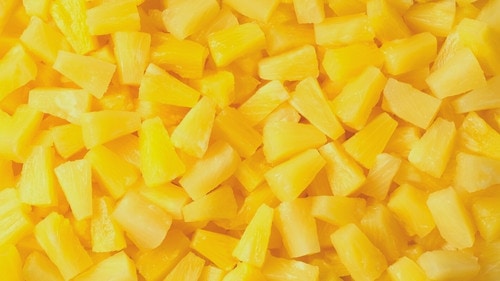
Make a gentle start
When introducing a treat to your pet rabbit, it is good to do so gradually as you monitor its reaction. Tropical fruits like pineapple can disrupt your bunny’s digestive bacteria if you load them in too fast.
Start with just a tiny nibble, and keep an eye on them for a couple of days to see how their system reacts. If they seem unaffected, continue to give your rabbit a little bit more each time as you monitor any signs of stomach upset or diarrhea.
What Are the Risks of Overfeeding Pineapples to Rabbits?
Pineapples have high sugar content, which means feeding too much pineapple can be bad for your bunny.
According to the USDA, there are 11.4 g of sugar in a 100 g serving of fresh pineapple, while pet rabbits only need 2 g of sugar a day.
Feeding too much pineapple can cause an overgrowth of bacteria in your rabbit’s digestive system.
You will notice that your rabbit becomes restless and has stomach pains and diarrhea. The high sugar content in pineapples can also cause diabetes and dental problems.
FAQs
Can you feed pineapples to baby rabbits?
You should hold off giving rabbits pineapples during their first seven months.
Baby rabbits have very sensitive stomachs, and giving them pineapple will be detrimental to their health.
Once weaned from their mother’s milk, rabbit kits should eat hay, pellets, and leafy greens as their digestive flora establishes. You can start to introduce fruit when they are around seven months old.
Can rabbits eat canned pineapple?
Canned fruit is often soaked in syrup or contains added sugar, which is not recommended for your pet rabbit. Even rinsing the pineapple is unlikely to wash out all of the syrup.
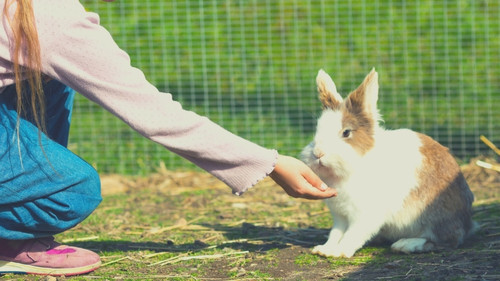
If you have canned pineapple in natural juice, you can give a small amount on occasion, but fresh pineapple is still more healthy for your bunny than canned pineapples.
Can bunnies eat frozen pineapple?
Frozen fruits can be great treats, especially on hot days, but should you feed your rabbit frozen pineapples? Yes, you can serve your pet bunnies frozen pineapple chunks. However, you should let the frozen pineapple defrost a little first before offering it as a treat to your pet bunny.
It is advisable to consult your vet before offering frozen pineapple as a treat to your pet rabbit since eating frozen fruits has been associated with infections.
Can you give pineapple juice to bunnies?
Pineapple juice contains a lot of sugar, without the fiber and other benefits of the fresh fruit. So for the most part, it’s best to give your rabbit fresh water to drink, rather than juice.
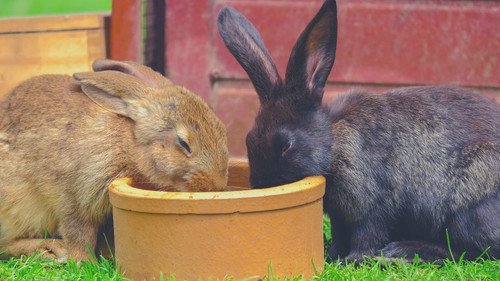
That said, some veterinarians find pineapple juice good for encouraging a rabbit to eat when it’s feeling poorly. The delicious fruit juice has the right amount of sugar and tang to kick-start the rabbit’s digestion and prevent it from going into GI stasis.
Can bunnies eat dried pineapple?
Rabbits can eat dried pineapple in small amounts as an occasional treat, but it is very concentrated and high in sugar.
If you are going to offer dried pineapple to your rabbit, choose an unsweetened version that has no extra sugar or syrup.
Can rabbits eat pineapple cores and leaves?
Pineapple cores are hard and have a bitter taste compared to the flesh.
It’s not recommended to feed pineapple cores to your pet bunny because of the amount of acid they contain, so it’s better to feed it the fleshy, juicy part of the pineapple.
As rabbits like to nibble on a natural grass-based diet, you may wonder, can rabbits eat pineapple leaves? The answer to this one is no. Pineapple leaves are very spiky and contain long, tough fibers, which can be a choking hazard. They are also bitter, and your pet rabbit won’t enjoy eating them.
Conclusion
Bunnies enjoy eating pineapple and would satisfy their sweet tooth all day long if you let them! But a diet of only fruit contains too much sugar and will make your rabbit sick. A rabbit’s body needs hay, fresh vegetables, and a limited amount of pellets each day, with fresh fruits as an occasional treat once or twice a week.
If you choose to let your rabbit eat pineapple, offer it as an occasional treat and not as a regular diet, to help your rabbit stay healthy. It’s best to offer rabbit pineapple in small portions and monitor for any changes in behavior or digestive problems. Consult with a veterinarian if you are unsure or if you notice any changes in your bunny.
If you found this information helpful, please consider liking and sharing it with others who may benefit from it. Comment below if you have any questions, and we will be happy to answer.


